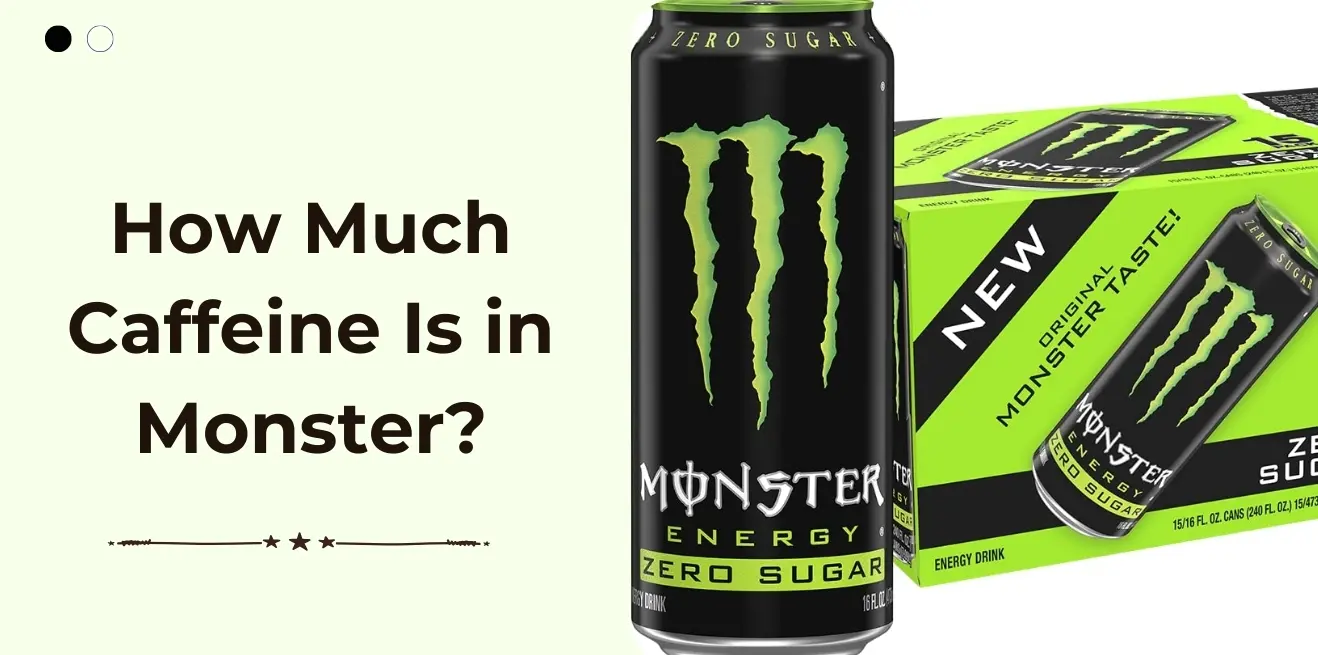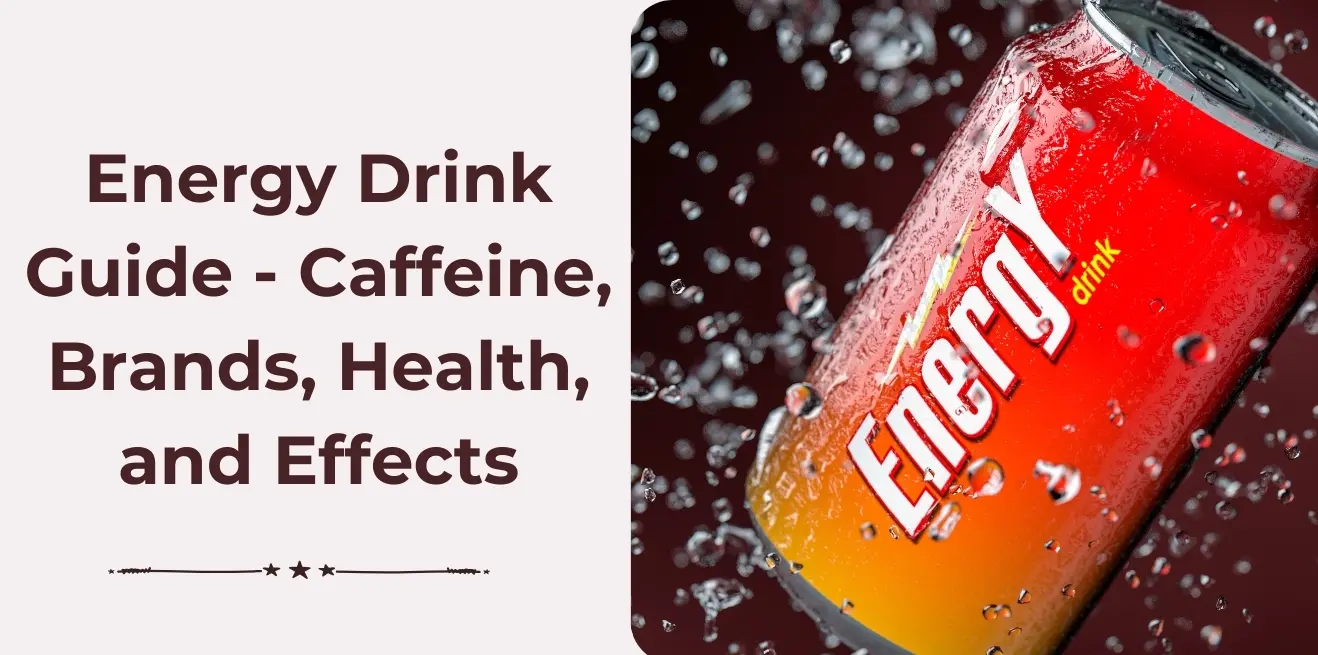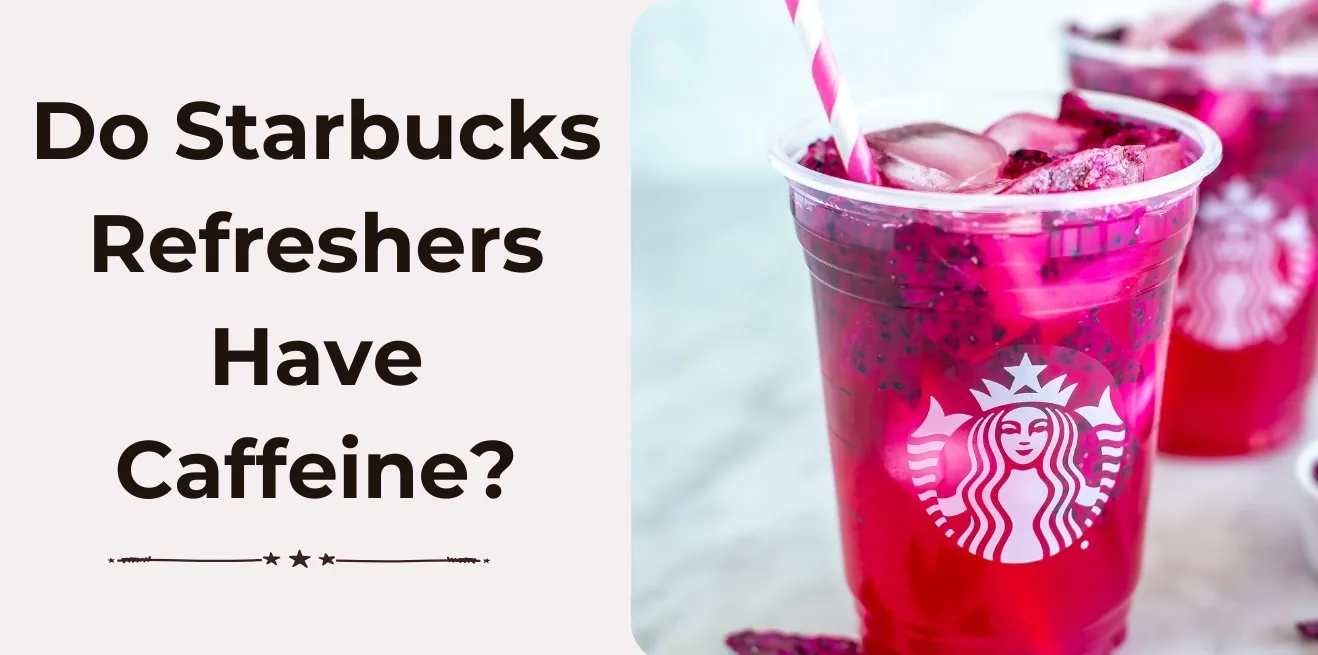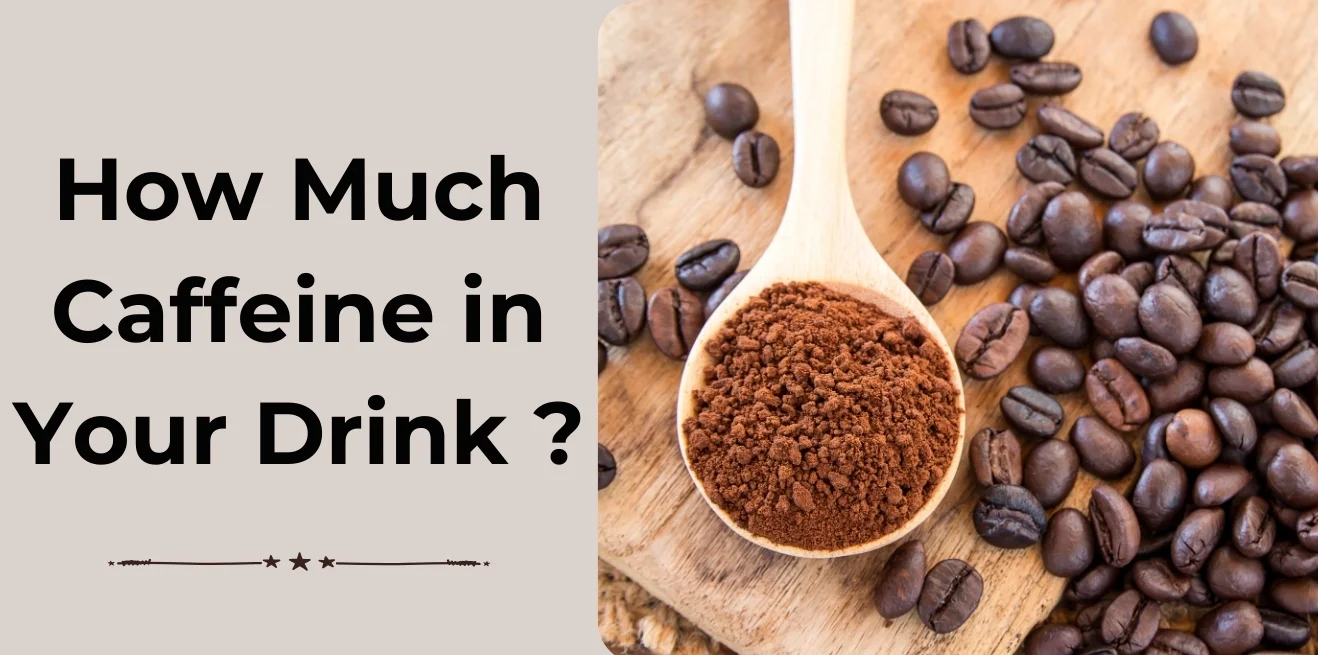Why Understanding Monster’s Caffeine Content Matters
Monster Is Popular—But Not Risk-Free
Monster is one of the most Popular energy drinks in the World. People drink it to stay awake, improve focus, or get a quick energy boost. But we should know that how much caffeine is in 1 can of Monster Drink because too much can harm your health.
Who Needs to Be Careful?
Teens, athletes, and frequent drinkers should be especially careful:
- Teens are still growing, and their bodies may react more strongly to caffeine.
- Athletes might drink Monster to improve performance, but too much can lead to a fast heartbeat or sleep problems.
- Regular users might not realize how much caffeine they’re getting daily, especially if they drink other caffeinated drinks too.
Caffeine Doesn’t Equal Real Energy
Some people think caffeine gives energy, but it is not completely true. Caffeine works by blocking signals in your brain that make you feel tired. It helps you feel more alert, but the reality is that it don’t give your body actual fuel or energy.
What too Much Monster Drink Can do ?
Drinking too much Monster can cause:
- Jitters
- Anxiety
- Trouble sleeping
- Heart issues
Does Monster Energy Contain Caffeine?
Yes, Monster Energy definitely contains caffeine. In fact, it has more caffeine than many soft drinks and even some types of coffee. This is one of the main reasons why people drink it—to feel more awake and focused.
Caffeine Is a Core Ingredient
Caffeine isn’t just a small part of Monster. It’s one of the main ingredients. Monster is designed to give you a quick mental and physical boost, and caffeine plays a big role in that. It helps you stay alert by blocking the signals in your brain that make you feel tired.
How Monster Is Marketed as “Energy”
Monster is sold as an energy drink, but it doesn’t give you real energy like food does. Instead, it makes you feel more awake and active for a short time. The drink uses caffeine, sugar, and other stimulants to create this effect. So when Monster says it gives you “energy,” it’s really talking about the way caffeine affects your body—not actual energy that fuels your muscles.
You can Also Read How Much Caffeine Is in Your Drink?
How Much Caffeine Is in Different Monster Drinks?
Different Monster drinks contain varying amounts of caffeine. Here’s a breakdown of some popular options:
1. Monster Energy Original – 160 mg per 16 oz
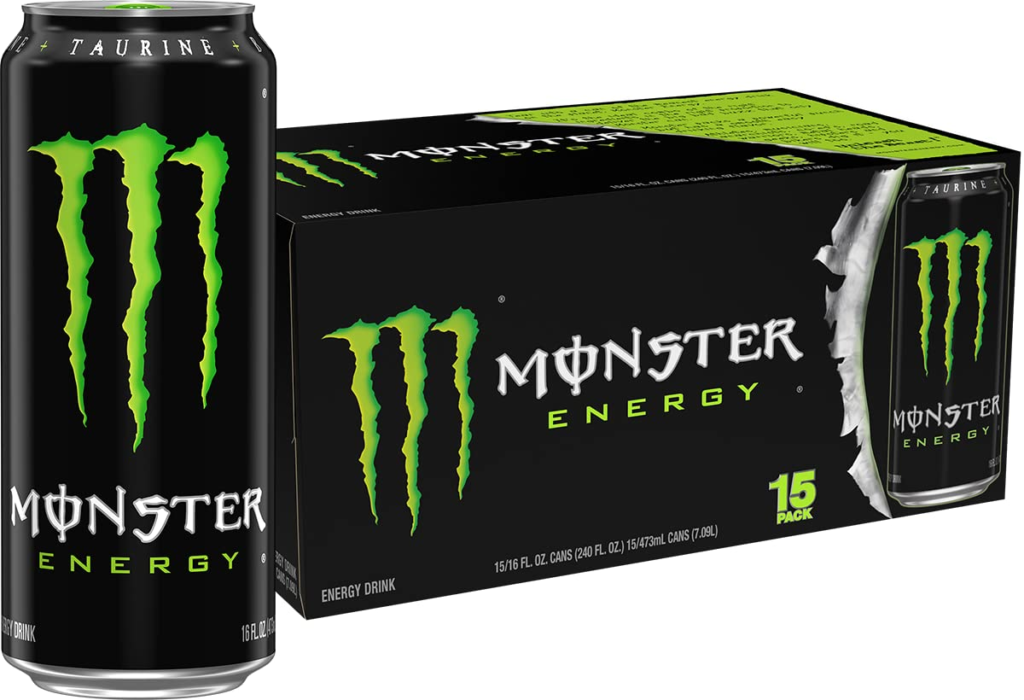
This is the classic Monster drink. It contains 160 mg of caffeine in a 16-ounce can .
2. Monster Zero Ultra – 140 mg per 16 oz
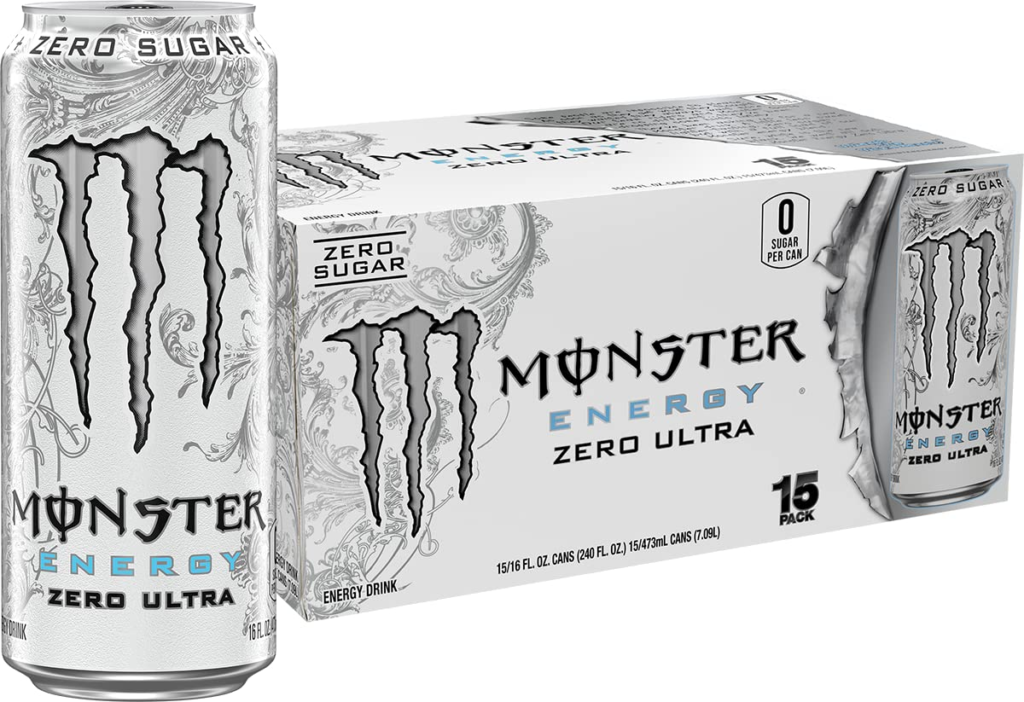
This sugar-free version has slightly less caffeine, with 140 mg in a 16-ounce can and they come in different flavours like Zero Ultra (White), Ultra Fiesta Mango, Ultra Gold, Ultra Peachy Keen, Ultra Paradise, Ultra Watermelon, Ultra Violet, Ultra Blue, Ultra Black, Ultra Sunrise, Ultra Strawberry Dreams, Ultra Fantasy Ruby Red, Ultra Vice Guava etc.
3. Monster Energy Lo-Carb – 140 mg per 16 oz
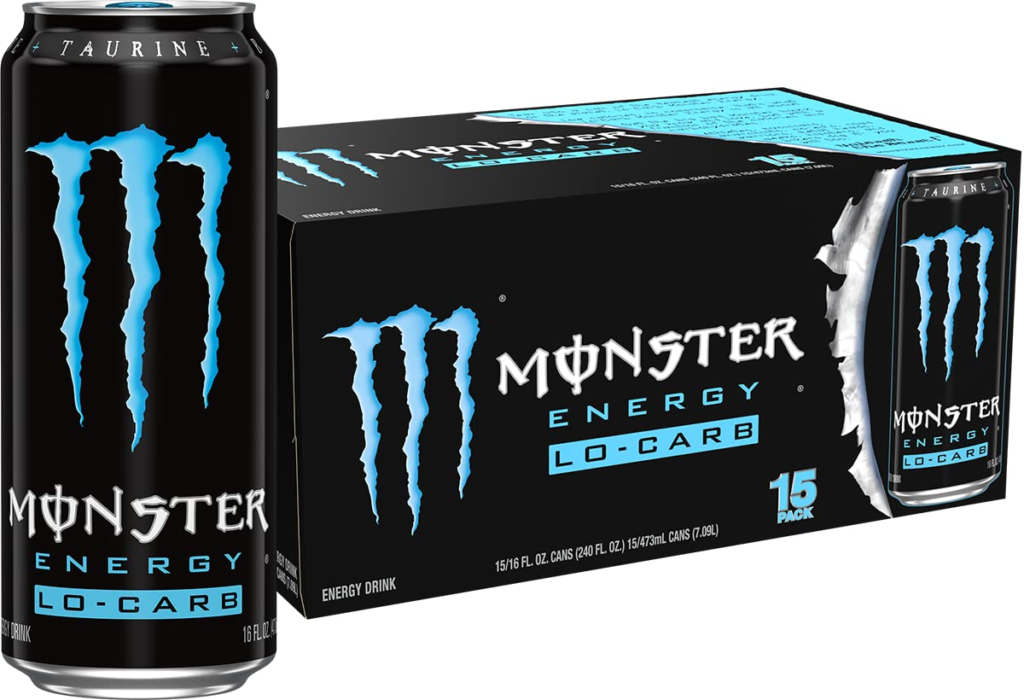
Designed for those watching their carb intake, this drink offers 140 mg of caffeine in a 16-ounce can .
4. Monster Rehab – 160 mg per 15.5 oz
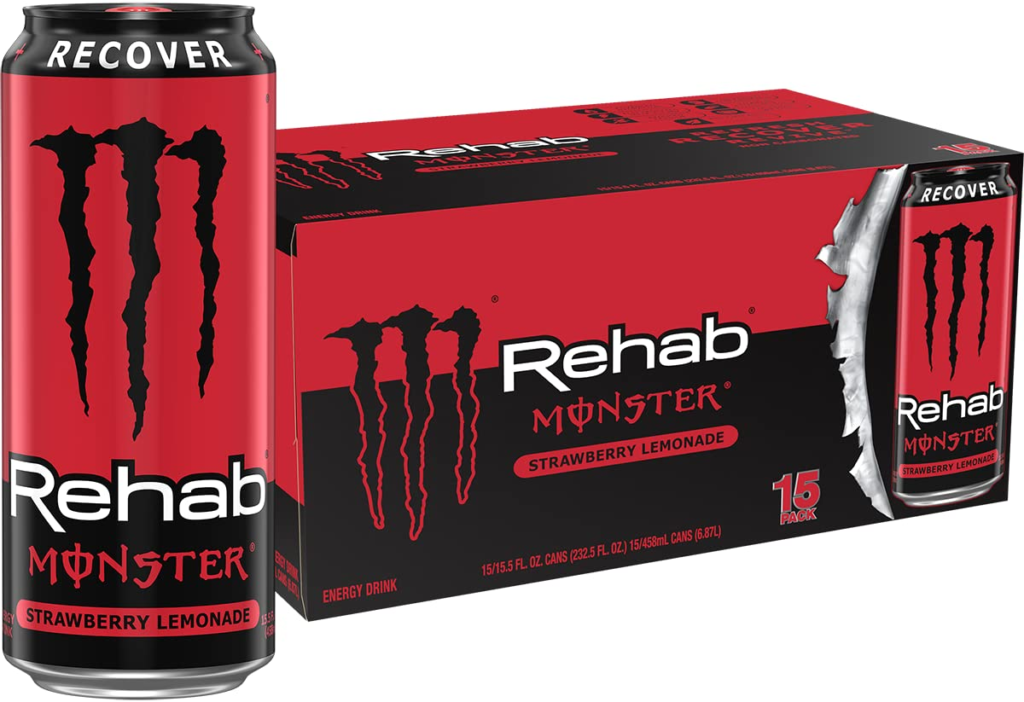
Combining tea, lemonade, and energy ingredients, Monster Rehab provides 160 mg of caffeine in a 15.5-ounce can .
5. Java Monster (Coffee + Energy) – 200 mg per 15 oz
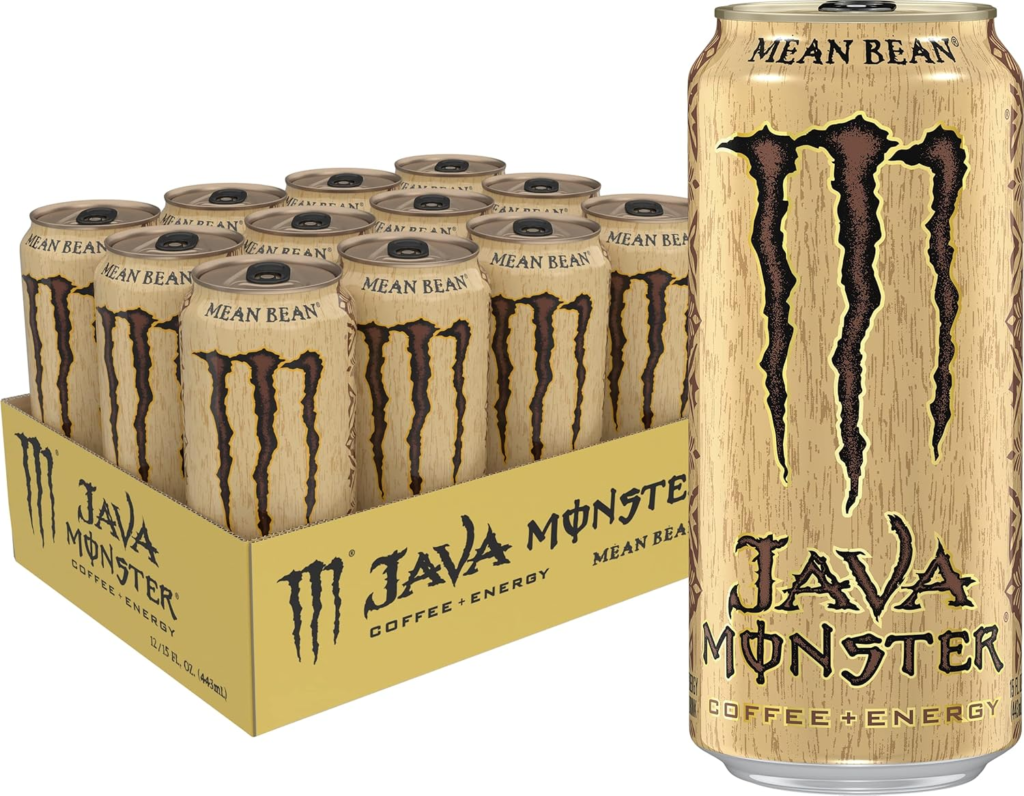
This blend of coffee and energy drink delivers 200 mg of caffeine in a 15-ounce can .
6. Monster Import – 179 mg per 18.6 oz

Packaged in a larger can, Monster Import contains 179 mg of caffeine in an 18.6-ounce serving .
Ingredient Breakdown: Where the Caffeine Comes From

Monster doesn’t depend on only one source of caffeine. It uses a mix of ingredients to create its energizing effect. Here’s where the caffeine in Monster comes from:
1. Added Caffeine
This is the main source of caffeine in Monster. It’s made in labs and added to the drink to give it a strong and quick effect. Added caffeine works fast and helps you feel more awake shortly after drinking it.
2. Guarana Extract
Guarana is a plant that grows in South America. Its seeds naturally contain caffeine. Guarana is often used in energy drinks because it can provide a longer-lasting boost. Monster includes guarana extract in many of its drinks to support the effects of added caffeine.
3. Green Tea Extract (in Some Variants)
Some Monster drinks also contain green tea extract. Green tea has a small amount of natural caffeine. It’s also known for antioxidants, which can be good for health. This ingredient is usually found in lighter or “health-focused” versions of Monster.
4. Yerba Mate (in Select Formulas)
Yerba mate is another plant from South America. It has natural caffeine and is sometimes used in energy drinks like Monster. It gives a smoother boost and is often added to make the drink feel more natural or balanced.
Caffeine Comparison: Monster vs Other Popular Drinks
It helps to compare Monster with other drinks to understand how strong it really is. Here’s how Monster’s caffeine content stacks up:
1. Monster vs Red Bull
- Monster (16 oz): 160 mg of caffeine
- Red Bull (8.4 oz): 80 mg of caffeine
Monster has twice as much caffeine as a regular can of Red Bull, but the can is also about twice the size.
2. Monster vs Bang Energy
- Monster (16 oz): 160 mg
- Bang (16 oz): 300 mg
Bang has almost double the caffeine of Monster. It’s one of the strongest energy drinks and not recommended for teens or people sensitive to caffeine.
3. Monster vs Coffee (Drip, Espresso)
- Monster (16 oz): 160 mg
- Drip coffee (8 oz): About 95–120 mg
- Espresso (1 oz shot): About 63 mg
Monster has more caffeine than a regular cup of coffee but less than a strong cup or multiple espresso shots.
4. Monster vs Pre-Workout Supplements
- Monster (16 oz): 160 mg
- Pre-workouts: Usually 150–300 mg per scoop
Some pre-workouts can contain as much or even more caffeine than Monster. But they often come with other strong ingredients too, made especially for athletes.
5. Monster vs Tea & Soda (Coke, Pepsi, etc.)
- Monster (16 oz): 160 mg
- Black tea (8 oz): 30–50 mg
- Coke (12 oz): 34 mg
- Pepsi (12 oz): 38 mg
Monster has way more caffeine than tea or soda. A single can of Monster equals the caffeine in about 4–5 cans of Coke.
What is the Daily Caffeine Limit in Energy Drinks?
It’s important to know how much caffeine is considered safe, especially if you Regularly Consume energy drinks like Monster.
FDA Recommendation: 400 mg/day (for adults)
The U.S. Food and Drug Administration (FDA) says that 400 mg of caffeine per day is safe for most healthy adults. This equals about:
- 2.5 cans of Monster (16 oz each)
- 4–5 cups of regular coffee
Going over this limit can lead to health problems, especially if done regularly.
How Many Monsters Is Too Many?
Since one 16 oz can of Monster has about 160 mg of caffeine, drinking more than 2 cans a day can bring you close to or over the safe limit.
For teens and kids, the limit is much lower—many health experts say they should have no more than 100 mg per day, and some say none at all.
Risks of Excessive Caffeine (Heart, Sleep, Anxiety)
Too much caffeine can lead to:
- Heart issues: Fast heartbeat, high blood pressure, or even heart palpitations
- Sleep problems: Trouble falling or staying asleep
- Anxiety: Feeling jittery, nervous, or restless
In large amounts, caffeine can also cause headaches, nausea, and even lead to dependence.
Monster for Different Age Groups: Safe or Not?
We should note that everyone reacts to caffeine the same way. Age, health, and body type all play a role in how safe it is to drink Monster.
Teens and Adolescents
Health experts do not recommend energy drinks like Monster for teens. Their bodies are still developing, and caffeine can affect their sleep, mood, and heart.
Most guidelines say teens should have no more than 100 mg of caffeine per day, but one can of Monster has 160 mg, which already passes the limit.
Monster can also make teens feel jittery or anxious, and it may raise the risk of heart problems, especially if mixed with sports or little sleep.
Pregnant or Breastfeeding Individuals
Pregnant and breastfeeding people need to limit caffeine. Doctors recommend less than 200 mg of caffeine per day during pregnancy.
One can of Monster has close to that amount, so drinking even one may be too much. High caffeine levels during pregnancy have been linked to low birth weight and other health issues for the baby.
Caffeine-Sensitive People
Some people feel strong effects even from a small amount of caffeine. These people are called caffeine-sensitive.
For them, Monster can cause:
- Fast or irregular heartbeat
- Shakiness
- Trouble sleeping
- Nausea
If someone feels sick, dizzy, or anxious after drinking caffeine, they should avoid energy drinks like Monster.
How Monster Affects the Body
Monster may help you feel more awake at first, but it also comes with some side effects. Here’s what it can do to your body:
Immediate Energy Boost
Right after drinking Monster, many people feel more alert and active. This happens because of the high caffeine and sugar content.
Caffeine blocks the brain’s tired signals, while sugar gives a fast rise in blood sugar levels. Together, they make you feel like you have more energy.
Crash and Burn Effects
That boost doesn’t last long. After a few hours, your energy may suddenly drop. This is known as a “crash.”
It can leave you feeling more tired than before. The more sugar and caffeine you had, the harder the crash might feel. Some people also feel irritable or unfocused afterward.
Impact on Sleep
Drinking Monster too late in the day can make it hard to sleep. Caffeine stays in your body for several hours. Even if you fall asleep, your sleep may not be deep or restful. Poor sleep from energy drinks can lead to problems with focus, mood, and health over time.
Dehydration, Heart Rate, and Mood
- Dehydration: Caffeine can make your body lose water faster, especially if you’re not drinking enough fluids.
- Heart Rate: Monster can cause your heart to beat faster or feel like it’s pounding, especially in large amounts.
- Mood Swings: After the high wears off, you may feel anxious, restless, or even sad. Some people also feel jittery or stressed.
Alternatives to Monster Energy
1. Caffeine-Free Energy Drinks
Some energy drinks are made without caffeine. These use vitamins, electrolytes, and other ingredients to boost focus and hydration without the jitters.
2. Natural Energy Options (Green Tea, Yerba Mate)
Green tea and yerba mate offer a gentler energy boost. They contain natural caffeine, but in lower amounts. They also have antioxidants, which are good for your body.
3. Low-Caffeine Monster Variants
Monster has a few drinks with less caffeine, like Monster Zero Ultra or Monster Energy Lo-Carb. These are better choices if you want the taste but with less of a buzz.
4. DIY Pre-Workout Smoothies
Blending fruits, spinach, oats, and a bit of protein powder can give you lasting energy without caffeine. These smoothies help fuel your body in a healthy way.
How to Consume Monster Safely
If you choose to drink Monster, here’s how to do it more safely:
Limit Frequency and Serving Size
Stick to one can per day or less. Drinking more than that can push you over the safe caffeine limit.
Don’t Mix with Alcohol
Mixing energy drinks with alcohol is risky. It can hide how drunk you feel and lead to dangerous choices.
Avoid Before Bed or Workouts
Drinking Monster late in the day can ruin your sleep. Before a workout, it might cause your heart rate to go too high.
Watch for Signs of Overconsumption
If you feel shaky, anxious, dizzy, or have a fast heartbeat, you may be getting too much caffeine. Take a break and drink water.
Conclusion: How Much Monster Is Too Much?
Monster Energy drinks contain a serious amount of caffeine. For most people, one can is enough in a day. Too much can cause sleep problems, mood swings, or health risks.
Always read the label, know your limit, and drink responsibly.
FAQs About Monster and Caffeine
Q1: How many Monsters can I drink in a day?
Most adults should limit themselves to 1 can per day. More than that may push you over the safe caffeine limit.
Q2: Is Monster stronger than coffee?
Yes, per can, Monster often has more caffeine than a regular cup of coffee.
Q3: Can I drink Monster before a workout?
It’s not the best choice. Some people feel shaky or overstimulated. Try a pre-workout drink made for exercise instead.
Q4: Does Monster keep you awake?
Yes, it can. The caffeine can block tiredness for several hours, which may lead to trouble sleeping.
Q5: What’s the strongest Monster flavor?
Java Monster and Monster Energy Shots have some of the highest caffeine levels—up to 200–240 mg per serving.
Data Taken From the Official Monster Energy Drink Website:

